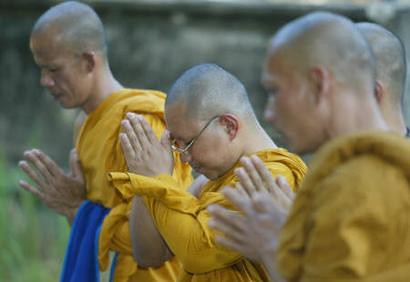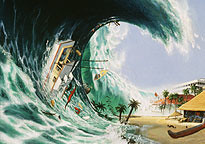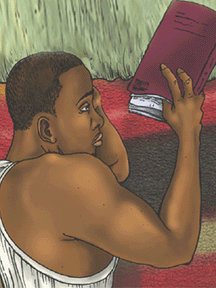TSUNAMI: Religious Justification

Thai monks pray during a cremation ceremony for victims of the Tsunami in Phang Nga. Over 117,000 now presumed gone.
Here are some excerpts of an article I found online called "Why Bad Things Happen: How different religions view the reasons for undeserved human suffering." by Ellen Leventry. Thought it worked well with my last post.
Buddhism
According to the first two Noble Truths of Buddhism all of life is suffering and suffering is caused by attachments to worldly things. This attachment, which can take the form of greed, hatred, and ignorance in this life and past lives, can, unless mitigated, return as more suffering (karma). According to the Dhammapada, "By oneself the evil is done, and it is oneself who suffers: by oneself the evil is not done, and by one's Self one becomes pure." Suffering caused by disasters is not necessarily punishment from a divine being, but rather something that must be transcended by not clinging to material objects or relationships. According to Lama Surya Das, bad things happen to good people "because there are myriad karmic causes conspiring to bring about any particular event, which then becomes cause for other effects to take place."
Christianity
The question of the unjustified suffering of the innocent is at the heart of Christianity, which holds that a sinless man (Jesus) suffered and died for the sins of humanity. Some Christians see in natural disasters God's punishment of sinful people or the world as a whole. Others see catastrophes as a way a loving God tests the faith and fortitude of survivors. According to St. Paul, Christians should rejoice in suffering because it produces endurance, hope and character (Romans 5:3-5). Still other Christians see innocents' suffering as evidence of the inscrutable will of a God who "works in mysterious ways" toward an ultimate but unknowable good. Some Christians offer no explanation but, like Job, seek to trust in God. In the past, Roman Catholic Christians were taught that they should "offer up" pain, with the idea that through faith, suffering that seems meaningless can be redeemed and transformed. Most Christians believe that innocents who die in natural disasters go to heaven. Some Christians believe the deceased must be a baptized, believing Christian to attain salvation.
The fourth-century saint Augustine says, "God would not allow any evil to exist unless out of it he could draw a greater good. This is part of the wisdom and goodness of God."
Hinduism
Many Hindus view suffering, including that caused by natural disasters, as punishment for misdeeds committed in this lifetime or past lives. Even a seemingly innocent person who has not eradicated bad karma from past lives through charitable deeds is susceptible to such payback. Individuals' suffering should be placed in the broader context of a cosmic cycle of birth, life, destruction and rebirth. Hindus believe victims will be reincarnated and may be happier in their next life.
Islam
The very word "Islam" means "submission." Many Muslims understand that to include suffering--enduring pain or loss is a way of submitting to the will of Allah. Some suffering is Satan's doing or is the work of his cohorts in the spirit world (the "jinn") and is allowed by Allah as a test of humility and faith. Many Muslims believe suffering and adversity strengthen one's faith, as pain often leads to repentance and prayer and good deeds. The Qur'an mentions many incidents of Allah using natural disasters as a way to maintain a balance of His natural laws or inflict a punishment on a population. Even the Prophet Muhammad appealed to Allah for protection against natural disasters. When the Prophet heard thunder and saw lightening, he said: "My Lord, do not kill us with Your wrath and do not send us to perdition by inflicting suffering on us. Spare us all that, our Lord."
Judaism
Sometimes it is believed that suffering is caused by a weakness in one's devotion to God. Generally, it is believed that God gave humans free will to feel pleasure and pain, and His purpose in allowing deep suffering of the innocent must be good even if mysterious. God suffers along with the sufferer. Many believe that God's sense of justice, and therefore the reasons for human suffering, are unknowable. To some Jews, knowing why God allows suffering is not as important as knowing that God will punish the perpetrators. All Jews place high importance on working to help those in need; the concept of tikkun olam, or repairing the world, will help allay undeserved suffering. Interestingly, suffering is the only issue listed in the Talmud that could lead a person to lose faith in God.



















